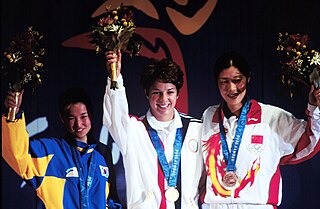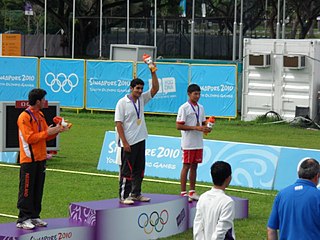
The Summer Olympic Games, also known as the Games of the Olympiad, and often referred to as the Summer Olympics, is a major international multi-sport event normally held once every four years on leap years. The inaugural Games took place in 1896 in Athens, Greece, and the most recent Games were held in 2021 in Tokyo, Japan. The International Olympic Committee (IOC) is responsible for organising the Games and for overseeing the host city's preparations. The tradition of awarding medals began in 1904; in each Olympic event, gold medals are awarded for first place, silver medals for second place, and bronze medals for third place.
The Winter Olympic Games were created out of the success of the Summer Olympic Games, which are regarded as the largest and most prestigious multi-sport international event in the world.

The 2004 Summer Olympics, officially known as the Games of the XXVIII Olympiad, were a summer multi-sport event held in Athens, the capital city of Greece, from 13 to 29 August 2004. A total of 10,625 athletes from 201 countries represented by National Olympic Committees participated in these games, competing in 301 events in 28 sports. Kiribati and Timor Leste competed for the first time in these Olympic Games.

The 2000 Summer Olympics, officially known as the Games of the XXVII Olympiad, were a summer multi-sport event held in Sydney, New South Wales, Australia, from 15 September to 1 October 2000. A total of 10,651 athletes from 199 nations represented by National Olympic Committees (NOCs) competed in 300 events in 28 sports.

The 1996 Summer Olympics, officially known as the Games of the XXVI Olympiad, were a summer multi-sport event held in Atlanta, Georgia, United States, from July 19 to August 4. A total of 10,339 athletes from 197 nations participated in 271 events in 26 sports across 37 disciplines.
The 1980 Summer Olympics, officially known as the Games of the XXII Olympiad, were an international multi-sport event held in Moscow, Russian SFSR, Soviet Union from 19 July to 3 August. A total of 5,179 athletes representing 80 National Olympic Committees (NOCs) participated in 203 events in 22 sports. They were the first Games to be staged in a communist nation.

The 1976 Summer Olympics, officially known as the Games of the XXI Olympiad, were a summer multi-sport event held in Montreal, Quebec, Canada, from July 17 to August 1, 1976. A total of 6,084 athletes from 92 countries represented by National Olympic Committees (NOCs) participated in these Games, competing in 198 events in 23 sports.

The 1972 Summer Olympics, officially known as the Games of the XX Olympiad, took place in Munich, West Germany, from 26 August through 11 September 1972. A total of 7,134 athletes from 121 National Olympic Committees (NOCs) competed in 195 events from 23 sports.
The 1932 Summer Olympics, officially known as the Games of the X Olympiad, was an international multi-sport event held in Los Angeles, California, United States, from July 30 to August 14.
The 1912 Summer Olympics, officially known as the Games of the V Olympiad, were an international multi-sport event held in Stockholm, Sweden, between 5 May and 27 July 1912. Twenty-eight nations and 2,408 competitors, including 48 women, competed in 102 events in 14 sports.

Athletes from Germany (GER) have appeared in 27 of the 30 Summer Olympic Games, having competed in all Games except those of 1920, 1924 and 1948, when they were not permitted to do so. Germany has hosted the Summer Olympic Games twice; the 1936 Games in Berlin, and the 1972 Games in Munich.

The all-time medal table for all Olympic Games from 1896 to 2022, including Summer Olympic Games, Winter Olympic Games, and a combined total of both, is tabulated below. These Olympic medal counts do not include the 1906 Intercalated Games which are no longer recognized by the International Olympic Committee (IOC) as official Games. The IOC itself does not publish all-time tables, and publishes unofficial tables only per single Games. This table was thus compiled by adding up single entries from the IOC database.

The 2006 Winter Olympics, officially known as the XX Olympic Winter Games, was a winter multi-sport event held in Turin, Italy, from February 10 to February 26, 2006. A total of 2,508 athletes representing 80 National Olympic Committees (NOCs) participated in 84 events from 15 different sports and disciplines.

Athletes from Germany (GER) have appeared in only 20 of the 22 editions of the Winter Olympic Games as they were not invited to two events after the World Wars, in 1924 and 1948. Germany hosted the 1936 Winter Olympics in Garmisch-Partenkirchen and had been selected to host in 1940 again.

Originally having participated in Olympics as the delegation of the Republic of China (ROC) from 1924 Summer Olympics to 1976 Winter Olympics,China competed at the Olympic Games under the name of the People's Republic of China (PRC) for the first time in 1952 Summer Olympics held in Helsinki, Finland, although they only arrived in time during the last days to participate in a one event. That year, the International Olympic Committee (IOC) allowed both the PRC and ROC to compete with the name "China", although the latter withdrew in protest. Due to the dispute over the political status of the "two Chinas", the PRC started a period of isolationism, withdrawing from several international sporting bodies and the UN system until the mid-1970s, when the country participated for the first time in the Asian Games in 1974 and the World University Games in 1977. Returning to the IOC officially only in 1979, which gave it the right to send an official delegation, starting from the 1980 Winter Olympics in Lake Placid, United States. Their first appearance at the Summer Olympic Games after 1952 was the 1984 Summer Olympics in Los Angeles, United States. The People's Republic of China staged boycotts of the Games of the XVI Olympiad in Melbourne, Australia, Games of the XVII Olympiad in Rome, Italy, Games of the XVIII Olympiad in Tokyo, Japan, Games of the XIX Olympiad in Mexico City, Mexico, Games of the XX Olympiad in Munich, Germany, and Games of the XXI Olympiad in Montreal, Canada. China also boycott the Games of the XXII Olympiad in Moscow, USSR due to the American-led boycott and the ongoing Sino-Soviet split, together with the other countries.
The women's 3 metre springboard, also reported as springboard diving, was one of four diving events on the diving at the 1936 Summer Olympics programme.

Marjorie Gestring was a competitive springboard diver from the United States. At the age of 13 years and 268 days, she won the gold medal in 3-meter springboard diving at the 1936 Summer Olympics in Berlin, making her at the time the youngest person ever to win an Olympic gold medal. She remains the second-youngest Olympic gold medalist, as of 2024. A multi-time national diving champion in the United States, she was given a second Olympic gold medal by the United States Olympic Committee after the 1940 Summer Olympics were called off due to the advent of World War II. Gestring attempted to return to the Olympics at the 1948 Games, but failed to qualify for the US team. She has been inducted into the International Swimming Hall of Fame and the Stanford Athletic Hall of Fame.

The 2008 Summer Olympics, officially known as the Games of the XXIX Olympiad, were a summer multi-sport event held in Beijing, the capital of the People's Republic of China, from 8 to 24 August 2008. Approximately 10,942 athletes from 204 National Olympic Committees (NOCs) participated in 302 events in 28 sports.

The 2010 Summer Youth Olympics, officially known as the Singapore 2010 Youth Olympic Games (YOG), were an international multi-sport event held in Singapore from 14 to 26 August 2010. The event was the inaugural Youth Olympic Games, and it saw 3,531 athletes between 14 and 18 years of age competing in 201 events in 26 sports. This medal table ranks the 204 participating National Olympic Committees (NOCs) by the number of gold medals won by their athletes. The Kuwait Olympic Committee was suspended by the International Olympic Committee (IOC) prior to the Games, but Kuwaiti athletes were allowed to participate and the country is listed in the table, bearing the Olympic flag.














